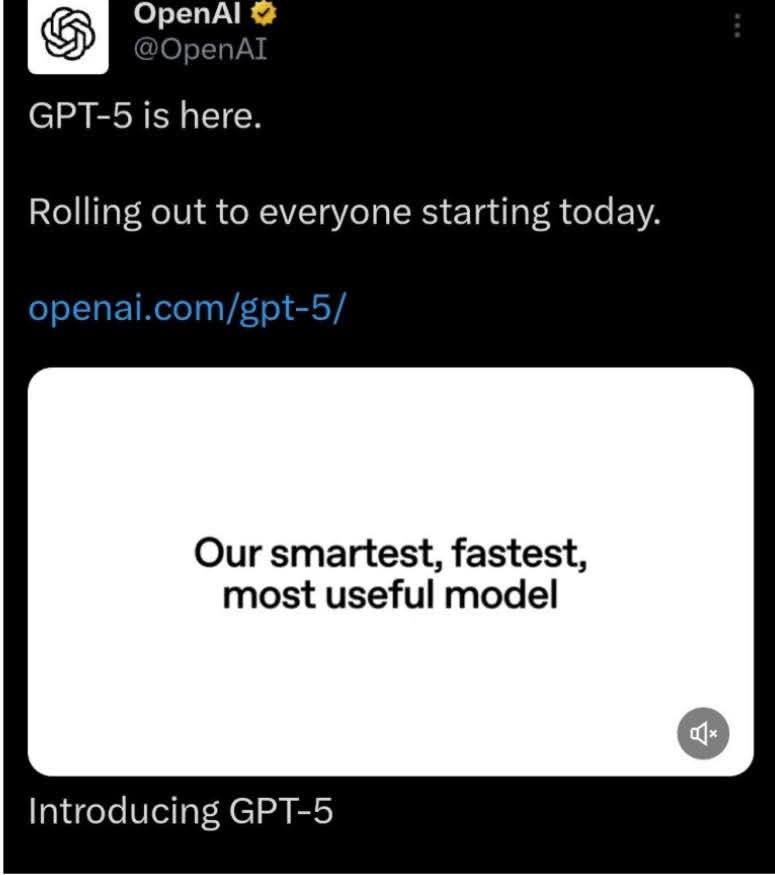GPT-5 Released Free: OpenAI's Revolutionary AI Model with PhD-Level Intelligence
AiVantage Newsletter
Archives
GPT-5 Released Free: OpenAI's Revolutionary AI Model with PhD-Level Intelligence
SIGN UP FOR OUR NEWSLETTER
Revolutionary GPT-5 Drops With PhD-Level Intelligence, Instantly Free for Everyone |
OpenAI's stunning new system unifies reasoning and multimodal power in one breakthrough model |

Felipe Martinez
Aug 7, 2025
OpenAI officially launched GPT-5 today, marking a massive leap in artificial intelligence with their most advanced large-scale model yet.
The groundbreaking system becomes instantly available to everyone, including free users, in a bold move that democratizes cutting-edge AI technology.
Sam Altman described the experience as transformative, saying "I tried going back to GPT-4, and it was quite miserable."
The CEO calls GPT-5 like having a team of Ph.D.-level experts on hand at any time.
This isn't your typical model upgrade — GPT-5 represents OpenAI's smartest, fastest, most useful model yet, uniting breakthrough frontier intelligence from 4o, the o-series reasoning models, agents, and advanced mathematics capabilities.
The unified system eliminates the need to switch between specialized models, bringing advanced reasoning, multimodal input, and task execution into a single platform.
The performance gains are staggering.
GPT-5 sets new records across critical benchmarks, achieving 94.6% on AIME 2025 math problems, 74.9% on real-world coding tasks, 84.2% on multimodal understanding, and 46.2% on challenging healthcare questions.
The model slashes hallucinations dramatically — responses are 45% less likely to contain factual errors than GPT-4o, and 80% less likely when using reasoning compared to OpenAI o3.
What makes GPT-5 revolutionary:
A massive 1 million token context window allows GPT-5 to track context across lengthy documents, dense codebases, or entire user sessions without losing coherence.
Persistent memory represents a breakthrough — unlike GPT-4, which forgets everything between sessions, GPT-5 remembers user preferences, tone, and past instructions, making it truly adaptive.
Enhanced multimodal performance means the system can reason more accurately over images, videos, charts, and diagrams, interpreting visual content with unprecedented precision.
The model intuitively determines when questions need deep reasoning, automatically applying the perfect amount of thinking to deliver optimal answers.
This changes everything for everyday users.
GPT-5 helps developers write, test, and deploy code faster while supporting advanced coding tasks with significant improvements to style and overall code quality.
Healthcare applications show dramatic improvement, with GPT-5 delivering more precise medical answers and acting as an active thought partner that asks follow-up questions.
The system excels at handling complex, evolving tasks, following instructions more faithfully and completing multi-step requests end-to-end using available tools.
OpenAI expects to hit 700 million weekly active ChatGPT users this week, positioning GPT-5 as the foundation for unprecedented AI adoption.
Internal benchmarks show GPT-5 with reasoning performs comparably to or better than human experts in roughly half of tested cases, spanning over 40 occupations including law, logistics, sales, and engineering.
The model becomes the new default in ChatGPT, automatically handling reasoning when responses would benefit from deeper thinking.
Multiple tiers ensure access for everyone:
Free users get significant access with usage limits, Plus subscribers can use GPT-5 comfortably as their default model, while Pro users receive unlimited access plus GPT-5 Pro.
When free users reach limits, they transition to GPT-5 mini, a smaller but highly capable variant designed for speed and efficiency.
The competition just got obliterated.
GPT-5's launch intensifies rivalry with Google's Gemini 3.0, as both companies race to outpace each other, driving faster innovation and continuous improvement in AI solutions.
The model demonstrates remarkable honesty about its limitations, giving confident made-up answers only 9% of the time compared to o3's 86.7%, with overall deception rates dropping from 4.8% to 2.1%.
As Altman puts it, "People are limited by ideas, but not really the ability to execute, in many new ways." |
